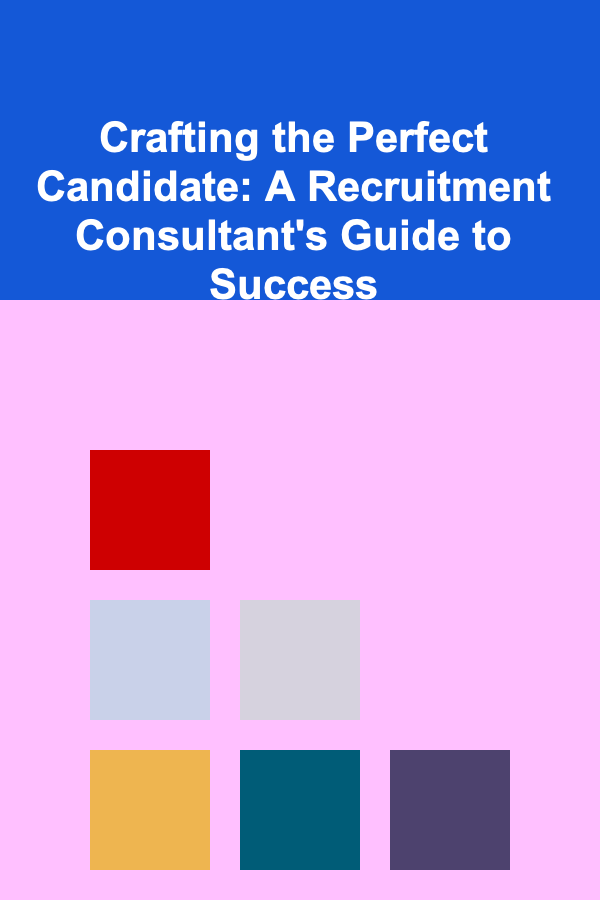
Crafting the Perfect Candidate: A Recruitment Consultant's Guide to Success
ebook include PDF & Audio bundle (Micro Guide)
$12.99$9.99
Limited Time Offer! Order within the next:

Recruitment consultants play a vital role in connecting businesses with the best talent available. A successful consultant doesn't just find candidates---they craft the perfect match between an organization's needs and an individual's skills, experience, and personality. Crafting the perfect candidate goes beyond simply filling a vacancy; it's about understanding both the technical and cultural aspects of the roles, the intricacies of the business, and the aspirations of the candidates.
In this guide, we will explore actionable strategies for recruitment consultants to not only identify but also craft the perfect candidate for their clients. From mastering the art of candidate sourcing to ensuring a lasting, successful placement, these strategies will help elevate your recruitment efforts and establish your reputation as a top-tier consultant.
Understand the Client's Needs and Company Culture
The first step to crafting the perfect candidate begins before you even start sourcing resumes. It's crucial that recruitment consultants take the time to understand the business they're hiring for and the specific needs of the client. This isn't just about reading a job description---it's about fully immersing yourself in the company's culture, goals, and team dynamics.
Actionable Tips:
- Client Consultation: Schedule in-depth meetings with key stakeholders to discuss the role. Ask about the company's culture, leadership style, and any challenges the team is facing. The more you know about the organization's day-to-day operations and its long-term vision, the better you can identify candidates who will fit seamlessly.
- Identify Soft Skills: In addition to technical expertise, inquire about the soft skills that will make someone successful in the role. For example, does the organization value collaboration, autonomy, or innovation? These insights can help shape a more holistic view of the ideal candidate.
- Create a Persona: Build a detailed candidate persona based on your understanding of the role and company. This should include not only the necessary technical skills but also personal traits, motivations, and values that align with the company's culture.
Source Candidates from Multiple Channels
To craft the perfect candidate, you need access to a wide range of potential candidates. Relying on a single platform, such as job boards, limits your reach. Effective recruitment consultants utilize a multi-channel approach to sourcing candidates.
Actionable Tips:
- Leverage Social Media: Utilize LinkedIn, Twitter, and industry-specific forums to find candidates who may not be actively looking for jobs but are open to new opportunities. Craft compelling posts that speak directly to your target audience's interests and motivations.
- Employee Referral Programs: Tap into your clients' existing networks by encouraging them to initiate employee referral programs. Candidates referred by current employees are often a better cultural fit and tend to have higher retention rates.
- Talent Pools and Databases: Build and maintain a database of qualified candidates you've previously engaged with. Even if they're not a fit for your current client, they could be a great match for future roles. This database can become a goldmine of pre-screened candidates ready to be contacted.
- Industry-Specific Platforms: Some industries have niche platforms or websites where professionals gather. Explore these to find highly specialized talent that is not as easily accessible on mainstream job boards.
Screen Candidates Thoroughly
Once you have a pool of candidates, the next critical step is to screen them effectively. Screening is not just about reviewing resumes---it's about assessing whether the candidate aligns with the client's needs, both in terms of technical abilities and cultural fit.
Actionable Tips:
- Structured Interviews: Develop a structured interview process with set questions designed to uncover relevant skills, experiences, and motivations. Structured interviews allow for better comparison between candidates and reduce the risk of bias.
- Behavioral and Situational Questions: Ask candidates to provide examples from their past work that demonstrate how they've handled challenges or worked in teams. For example, "Tell me about a time when you had to resolve a conflict within your team." This helps gauge how a candidate behaves in real-world scenarios.
- Skills Testing and Assessments: Depending on the role, consider implementing skills tests or case studies that simulate tasks the candidate will face in the job. This not only assesses their technical abilities but also helps gauge their problem-solving and analytical skills.
- Cultural Fit Evaluation: Conduct informal conversations to assess how a candidate aligns with the company culture. This might include questions about their preferred work environment, management style, and their approach to collaboration and conflict resolution.
- Reference Checks: Conduct thorough reference checks with previous employers to verify the candidate's experience and get an understanding of their work ethic, personality, and achievements. Aim for references that can speak specifically to the candidate's job performance and character.
Sell the Role and the Company to Top Candidates
Once you've identified potential candidates, your role doesn't end with just presenting them to the client. In fact, a great recruitment consultant knows that the most sought-after candidates often have multiple opportunities on the table. It's essential to sell both the role and the organization to the candidate to secure their interest.
Actionable Tips:
- Highlight the Unique Aspects of the Role: Focus on what makes the job exciting. Is it the chance to work with cutting-edge technology, the opportunity to lead a new team, or the ability to make a real impact on the business? Tailor your pitch to align with the candidate's motivations and career aspirations.
- Sell the Company's Vision: Top candidates are often looking for more than just a paycheck. They want to know how their work will fit into the bigger picture. Be sure to highlight the company's mission, vision, and values, and how the role aligns with the candidate's long-term goals.
- Be Transparent About Challenges: While it's important to highlight the role's positives, it's equally critical to be transparent about the challenges the candidate will face. This creates trust and helps avoid mismatches later on.
- Offer Insight into Company Culture: Describe the company culture in a way that resonates with the candidate's personality. Be specific about the work environment, the team dynamics, and the company's approach to work-life balance, leadership, and employee development.
Facilitate Smooth Communication Between Client and Candidate
Effective communication is crucial in the recruitment process. The relationship between the candidate and client must be nurtured to ensure a smooth hiring process and a positive experience for both parties.
Actionable Tips:
- Set Expectations Early: Clearly outline the timeline for interviews, feedback, and next steps. Both parties should know what to expect at each stage, which reduces anxiety and ensures the process moves forward efficiently.
- Provide Constructive Feedback: After interviews, share feedback with both the candidate and the client. This allows the client to adjust their expectations if necessary and helps the candidate understand areas where they performed well and areas for improvement.
- Encourage Open Dialogue: Foster open communication between the candidate and client. Ensure that both sides feel comfortable voicing concerns and asking questions. As a recruitment consultant, act as a mediator to ensure both parties are aligned.
Ensure a Positive Onboarding Experience
Once the candidate is hired, your job doesn't end. A seamless transition into the new role can significantly impact the candidate's long-term success and satisfaction. You can add value by helping facilitate the onboarding process.
Actionable Tips:
- Maintain Contact After Placement: Stay in touch with the candidate after their first few weeks on the job to ensure they are settling in well. Address any issues that might arise and serve as a liaison between the candidate and client if necessary.
- Support Client Onboarding: Advise your client on best practices for onboarding. Ensure that the new hire has all the resources they need, understands the company's processes, and feels welcome.
- Post-Placement Check-Ins: After a few months, check in with both the candidate and the client to assess the success of the placement. This allows you to address any issues early on and shows that you care about the long-term success of the hire.
Build Long-Term Relationships
One of the most valuable outcomes of being an effective recruitment consultant is building long-term relationships with both clients and candidates. A successful consultant doesn't just make one-time placements---they create a network of trusted clients and candidates who turn to them for future opportunities.
Actionable Tips:
- Stay Engaged: Keep in touch with past candidates and clients. Share industry insights, market trends, and relevant opportunities to stay top of mind.
- Offer Ongoing Support: Even after a placement is made, offer guidance and support to both the candidate and client as needed. Your ability to provide value at every stage of the process will solidify your reputation as a trusted partner.
- Solicit Feedback: Regularly ask for feedback on your services from both clients and candidates. This will not only help you improve your recruitment process but also foster stronger relationships.
Conclusion
Crafting the perfect candidate is an art that requires a deep understanding of both the needs of the client and the aspirations of the candidate. By following these actionable strategies---from understanding the client's culture to nurturing long-term relationships---you can ensure that your placements not only fill roles but also contribute to the success of your clients and the career growth of your candidates.
As a recruitment consultant, your goal is to create meaningful connections that benefit both parties. Through strategic sourcing, thorough screening, and effective communication, you'll craft the perfect candidate every time.
Reading More From Our Other Websites
- [Home Budget Decorating 101] How to Tackle the Budget-Friendly Home Decor Challenge
- [Organization Tip 101] How to Create a DIY Essential Oil Shelf for Your Home
- [Skydiving Tip 101] From Heart Rate to Vision: Key Health Requirements for Safe Skydiving
- [Organization Tip 101] How to Organize Jewelry by Occasion for Quick Access
- [Beachcombing Tip 101] 10 Easy Seashell Crafts to Transform Your Home Décor
- [Organization Tip 101] How to Designate a Kids' Zone in the Family Bathroom
- [Personal Care Tips 101] How to Improve Your Metabolism Through Diet and Exercise
- [Home Party Planning 101] How to Create the Perfect Party Favors for Your Home Celebration
- [Small Business 101] Small Business Accounting Software: Essential Features for Efficiency
- [Home Soundproofing 101] How to Soundproof a Home Using Natural and Eco-Friendly Materials

How to Create Eye-Catching T-Shirt Designs That Sell
Read More
How to Layer Textures in Your Holiday Decor for Extra Warmth
Read More
How to Maximize Closet Organization with Adjustable Shelving
Read More
How to Sell Your Rare Vinyl Records Through an Online Store
Read More
How To Declutter Your Laundry Room
Read More
10 Tips for Planning a Unique & Adventurous Date Night
Read MoreOther Products

How to Create Eye-Catching T-Shirt Designs That Sell
Read More
How to Layer Textures in Your Holiday Decor for Extra Warmth
Read More
How to Maximize Closet Organization with Adjustable Shelving
Read More
How to Sell Your Rare Vinyl Records Through an Online Store
Read More
How To Declutter Your Laundry Room
Read More